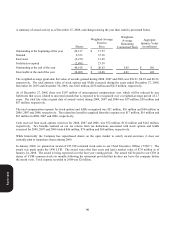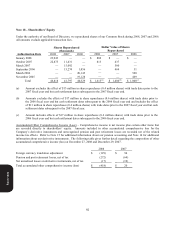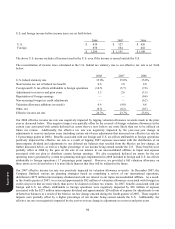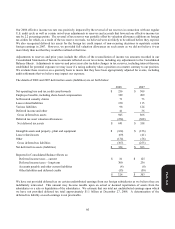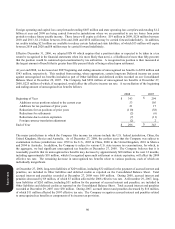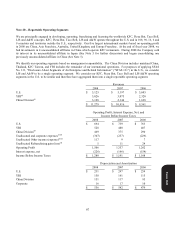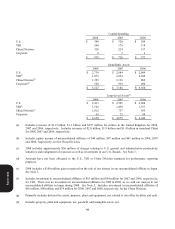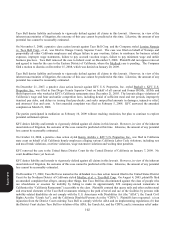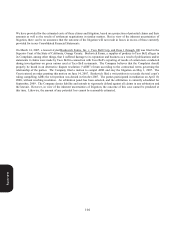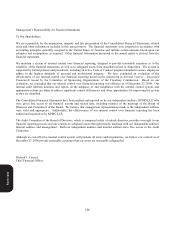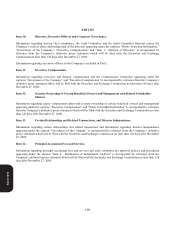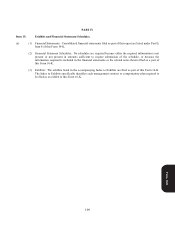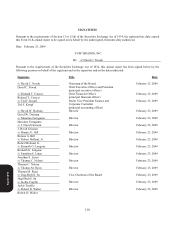Pizza Hut 2008 Annual Report Download - page 222
Download and view the complete annual report
Please find page 222 of the 2008 Pizza Hut annual report below. You can navigate through the pages in the report by either clicking on the pages listed below, or by using the keyword search tool below to find specific information within the annual report.
100
On June 15, 2004, the arbitrator in the Cole Arbitration issued a Clause Construction Award, finding that LJS’s Dispute
Resolution Policy did not prohibit Claimants from proceeding on a collective or class basis. LJS moved unsuccessfully to
vacate the Clause Construction Award in federal district court in South Carolina. On September 19, 2005, the arbitrator
issued a Class Determination Award, finding, inter alia, that a class would be certified in the Cole Arbitration on an “opt-
out” basis, rather than as an “opt-in” collective action as specified by the FLSA.
On January 20, 2006, the district court denied LJS’s motion to vacate the Class Determination Award and the United
States Court of Appeals for the Fourth Circuit affirmed the district court’s decision on January 28, 2008. A petition for a
writ of certiorari filed in the United States Supreme Court seeking a review of the Fourth Circuit’s decision was denied on
October 7, 2008. The parties participated in mediation on April 24, 2008, without reaching resolution. A second
mediation is scheduled for February 28, 2009.
LJS expects, based on the rulings issued to date in this matter, that the Cole Arbitration will more likely than not proceed
as an “opt-out” class action, rather than as an “opt-in” collective action. LJS denies liability and is vigorously defending
the claims in the Cole Arbitration. We have provided for a reasonable estimate of the cost of the Cole Arbitration, taking
into account a number of factors, including our current projection of eligible claims, the estimated amount of each eligible
claim, the estimated claim recovery rate, the estimated legal fees incurred by Claimants and the reasonable settlement
value of this and other wage and hour litigation matters. However, in light of the inherent uncertainties of litigation, the
fact-specific nature of Claimants’ claims, and the novelty of proceeding in an FLSA lawsuit on an “opt-out” basis, there
can be no assurance that the arbitration will not result in losses in excess of those currently provided for in our
Consolidated Financial Statements.
On September 2, 2005, a collective action lawsuit against the Company and KFC Corporation, originally styled Parler v.
Yum Brands, Inc., d/b/a KFC, and KFC Corporation, was filed in the United States District Court for the District of
Minnesota. Plaintiffs alleged that they and other current and former KFC Assistant Unit Managers (“AUMs”) were
improperly classified as exempt employees under the FLSA. Plaintiffs sought overtime wages and liquidated damages.
On January 17, 2006, the District Court dismissed the claims against the Company with prejudice, leaving KFC
Corporation as the sole defendant. Plaintiffs amended the complaint on September 8, 2006, to add related state law claims
on behalf of a putative class of KFC AUMs employed in Illinois, Minnesota, Nevada, New Jersey, New York, Ohio, and
Pennsylvania. On October 24, 2006, plaintiffs moved to decertify the conditionally certified FLSA action, and KFC
Corporation did not oppose the motion. On June 4, 2007, the District Court decertified the collective action and dismissed
all opt-in plaintiffs without prejudice. Subsequently, plaintiffs filed twenty-seven new cases around the country, most of
which alleged a statewide putative collective/class action. Plaintiffs also filed 324 individual arbitrations with the
American Arbitration Association (“AAA”). KFC filed a motion with the Judicial Panel on Multidistrict Litigation
(“JPML”) to transfer all twenty-eight pending cases to a single district court for coordinated pretrial proceedings pursuant
to the Multidistrict Litigation (“MDL”) statute, 28 U.S.C. § 1407. KFC also filed a motion with the Minnesota District
Court to enjoin the 324 AAA arbitrations on the ground that Plaintiffs waived the right to arbitrate by their participation in
the Minnesota (Parler) litigation. On January 3, 2008, the JPML granted KFC’s motion to transfer all of the pending court
cases to the Minnesota District Court for discovery and pre-trial proceedings. On January 4, 2008, KFC’s motion to
enjoin the 324 arbitrations on the ground that plaintiffs have waived their right to arbitrate was granted.
On August 30, 2008, KFC and counsel for plaintiffs entered into a settlement in principle to resolve this matter. On
November 11, 2008, the parties entered into a formal Settlement Agreement and Release. On November 20, 2008, the
court entered an Order Granting Final Judgment. The costs associated with the settlement did not significantly impact our
results of operations.
On August 4, 2006, a putative class action lawsuit against Taco Bell Corp. styled Rajeev Chhibber vs. Taco Bell Corp.
was filed in Orange County Superior Court. On August 7, 2006, another putative class action lawsuit styled Marina
Puchalski v. Taco Bell Corp. was filed in San Diego County Superior Court. Both lawsuits were filed by a Taco Bell
RGM purporting to represent all current and former RGMs who worked at corporate-owned restaurants in California from
August 2002 to the present. The lawsuits allege violations of California’s wage and hour laws involving unpaid overtime
Form 10-K


